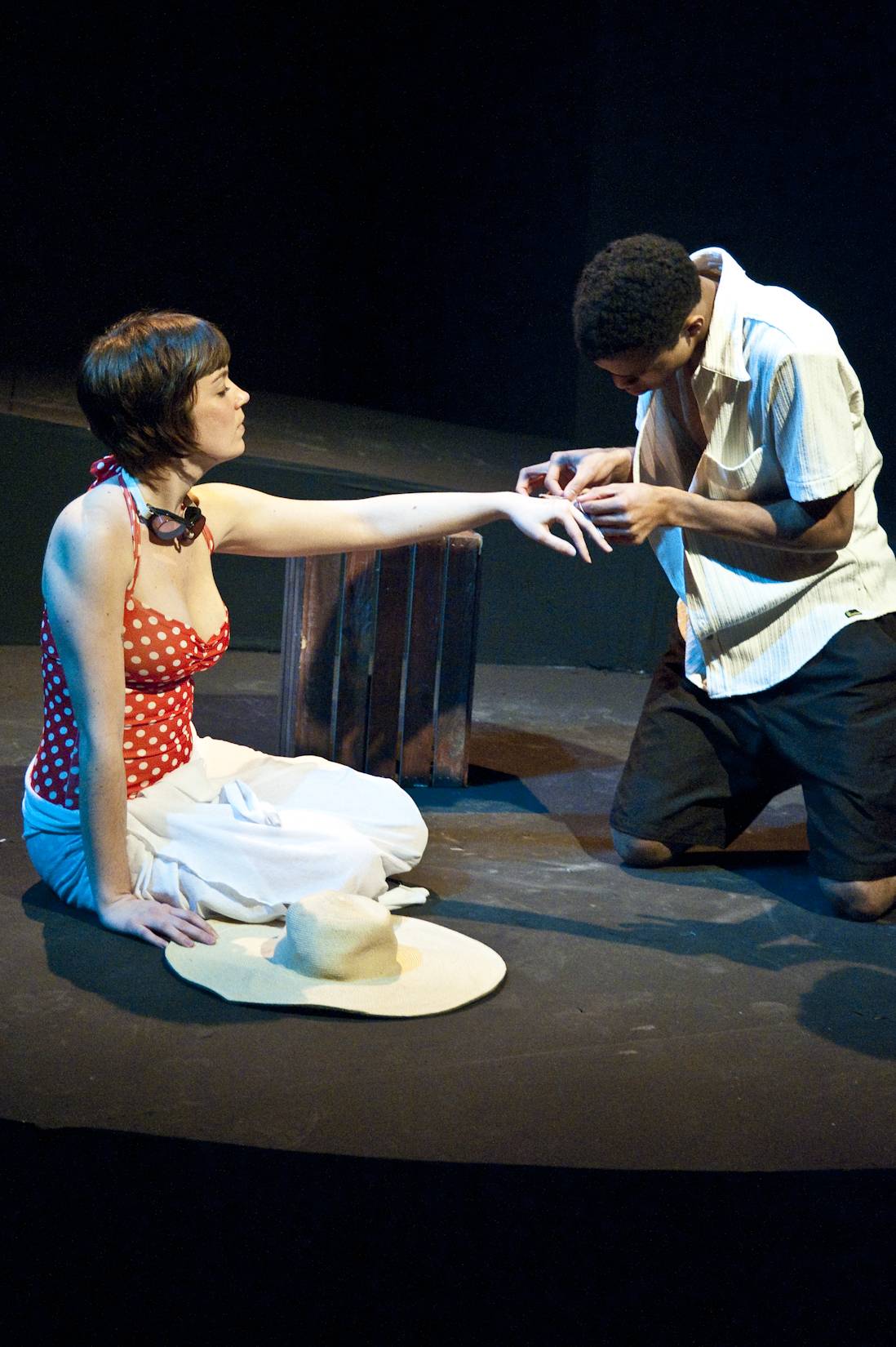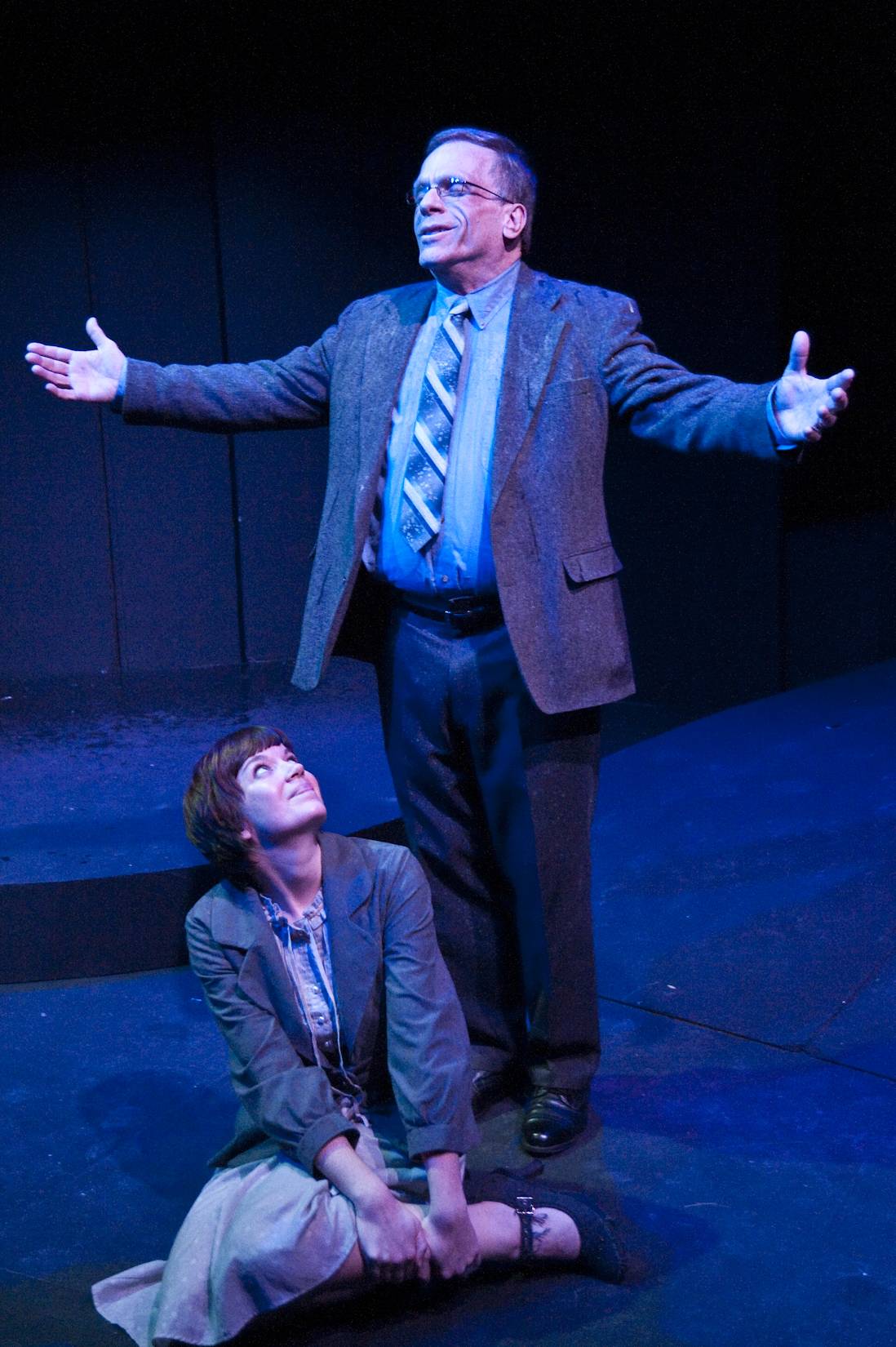Station Theatre | Wednesday–Saturday | 8 p.m. | Feb 16–26 | $8–$15
 Last Saturday, I had the privilege of attending the debut performance of Eurydice at the Station Theater in downtown Urbana. I’ve attended shows at the Station before, and I am continually impressed by the theater’s ability to house a strange, provocative stage (as the space was equipped with ramps, high ledges, and working faucets) while still maintaining an intimate atmosphere.
Last Saturday, I had the privilege of attending the debut performance of Eurydice at the Station Theater in downtown Urbana. I’ve attended shows at the Station before, and I am continually impressed by the theater’s ability to house a strange, provocative stage (as the space was equipped with ramps, high ledges, and working faucets) while still maintaining an intimate atmosphere.
The Play
Eurydice, written by Sarah Ruhl, is based on the ancient Greek myth, “Orpheus in the Underworld,” in which Orpheus’ wife, Eurydice, dies on their wedding night from a snake bite. Orpheus travels to the Underworld hoping to return Eurydice to the land of the living. Hades, lord of the Underworld, agrees to allow Eurydice to return with Orpheus on the condition that he walk in front of her without looking back for the entirety of the journey; if he does look back, Eurydice will die a second, permanent death. The story ends with Orpheus turning around just as he reaches the land of the living, forgetting that Eurydice is still in the Underworld, and thus, she is doomed to live in the land of the dead for the rest of eternity.
The play stays mostly loyal to the storyline of the original myth, but instead is set in the present and told from Eurydice’s perspective. Ruhl also writes in Eurydice’s deceased father, adding greater complexity to Eurydice’s relationship with Orpheus. Finally, the majority of the play takes place in the Underworld, which is a nightmarish funhouse equipped with raining elevators, trap doors, a Hades-like figure on a tricycle, and three wise stones who guard the entrance.
 Themes
Themes
On a deeper level, the play discusses how language and music can either promote or hinder the development of loving relationships. Ruhl portrays language as the expression of what is concrete; it is important for communicating facts and memories and for developing a sense of self. This theme is played out in the scenes where Eurydice (after being dipped in the river of forgetfulness) is re-educated by her father using memories of their lives on earth, and a dictionary dropped by Orpheus into the Underworld.
Whereas language represents some of the more concrete concepts in Eurydice, Green uses music to represent more abstract ideas such as risk and the unknown aspects of the characters’ relationships. We sense that Eurydice is uncomfortable with the unknown in various scenes wherein she expresses her confusion and frustration with Orpheus’ obsession with music and introspection. Ultimately, Eurydice’s discomfort leaves her with a difficult choice to make at the end of the play. Does she stay in the Underworld with her father, where she has a concrete sense of self, and thus feels comfortable and loved, or does she leave the Underworld and risk of being with a man she does not entirely understand, with hopes of growing as a person and maintaining a loving relationship?
Performances
Eurydice’s Father — Steven M. Keen
An extremely impressive performance. Keen plays the role with all the patience, regret, and nostalgia of a man who is blessed and cursed with the task of raising his daughter twice. He carries many of the emotionally potent scenes in the play, and is able to convey deep love without overacting.
 Hades or The Man/The Child — Dallas Street
Hades or The Man/The Child — Dallas Street
A hilarious and unsettling performance. He interprets Hades as an overly-sensitive, sexually ambiguous “manchild.” His wardrobe is incredibly ornate (to the point of garish) and his ability to establish an undertone of malice is impressive.
Orpheus — Christopher Brown
A confident performance by a young actor. He brings a lot of energy to the stage, and his undying commitment to Eurydice is believable. I would have liked to have seen him embody the physicality of his character more as he plays somewhat of a Prince/Michael Jackson-type figure.
Eurydice — Lindsay Markel
A strong, moving performance. Markel’s ability to embody a young, naïve girl is remarkable, and the relationship she has with her father evokes very warm and oftentimes painful emotions. I had some trouble believing her when she was acting as an adult, but this feeling is in accordance with one of the play’s major themes and may have been done on purpose.
Conclusion
On the whole, the play is hilarious, tragic, and thought provoking. The stage design is elaborate without being over-the top, and the commendable acting glues all of the elements of the play together. I strongly encourage going to see this play.
Photos by Patrick J. Keane








